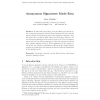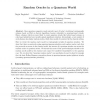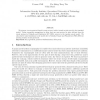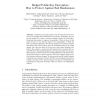242 search results - page 13 / 49 » Randomness in Cryptography |
PKC
2007
Springer
15 years 5 months ago
2007
Springer
Abstract. At PKC 2006, Yang, Wong, Deng and Wang proposed the notion of anonymous signature schemes where signatures do not reveal the signer’s identity, as long as some parts of...
ACSAC
2009
IEEE
15 years 6 months ago
2009
IEEE
To protect privacy in large systems, users must be able to authenticate against a central server without disclosing their identity to the network. Private identification protocols ...
CORR
2010
Springer
14 years 12 months ago
2010
Springer
Once quantum computers reach maturity most of today's traditional cryptographic schemes based on RSA or discrete logarithms become vulnerable to quantum-based attacks. Hence, ...
ACNS
2006
Springer
15 years 5 months ago
2006
Springer
We propose a new password-based 3-party protocol with a formal security proof in the standard model. Under reasonable assumptions we show that our new protocol is more efficient t...
106
click to vote
ASIACRYPT
2009
Springer
15 years 3 months ago
2009
Springer
Abstract. Public-key encryption schemes rely for their IND-CPA security on per-message fresh randomness. In practice, randomness may be of poor quality for a variety of reasons, le...




